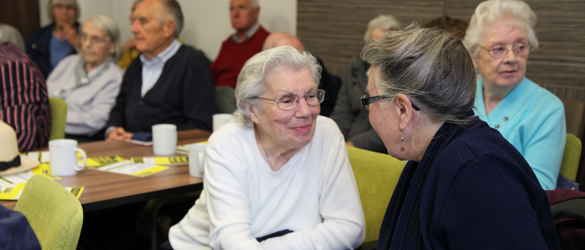
Supporting someone with macular disease?
A macular condition can bring practical, financial and emotional changes for those diagnosed, and for their family and friends.
People with a macular condition can become reliant on others to complete some everyday tasks for them. Everyone is different, and so is the level of help they want or need.
It’s important to respect individual abilities and support someone to carry on with everyday tasks, even if you feel they don’t do them as well as they used to.
It can be very difficult for you, as someone providing support, to ‘let go’. But most people with macular disease say they want to stay as independent as possible.
Living with macular disease is a journey for you and for the person with the condition. As time goes on and people experience vision changes or more sight loss, it can be upsetting. It may bring up the same feelings as when they were first diagnosed.
Understanding sight loss
It can be difficult to understand central vision loss. It may even appear that a person can see some things when they want to. This is because parts of the macula may still be working, and how well people are able to see also depends on light conditions and the environment.
How to talk about sight loss
Talk to the person affected. Try to understand how their sight has changed and how they want to be supported.
Two useful questions to ask someone with a macular condition:
1. What can you see and not see?
Understanding the person’s sight loss can help when making simple changes to home lighting, room layouts or buying low vision equipment. Remember, any change has to suit the person with the condition, not what you feel is right.
2. It’s common for people losing their sight to see things that aren’t there. Have you noticed anything like that?
As the brain adapts to sight loss it’s common to experience visual hallucinations known as Charles Bonnet syndrome. Some people enjoy their hallucinations, but others find them distressing.
How you can help day-to-day
There are lots of ways you can support someone with macular disease.
Depending on the amount of sight they have, they may need help with:
- Paperwork, shopping or cooking at home
- Choosing suitable low vision aids
- Contacting welfare or social services
- Adapting lighting in the home.
💡Top tip: Local councils provide a social services assessment for anyone whose daily life is being affected by their sight loss. They could offer rehabilitation training, low vision aids and practical help to ensure people with sight loss can continue to live independently.
Supporting emotional wellbeing
The experience of being diagnosed with a macular condition can be very challenging and emotional. People may experience loss, denial, anger and depression before acceptance. Their personality can change.
Someone with a macular condition won’t look any different from before they developed the condition. However, they may not be able to recognise friends and family. This can be distressing. Some people with macular conditions worry that they appear rude because they may walk past people they know without realising.
People with a macular condition often have to give up driving because of their sight loss. This can be upsetting, but doesn’t necessarily mean the end of a social life. They can still keep in touch with friends and even make new ones, such as through our support groups.
Looking after yourself as a carer
Supporting someone with a macular condition is a long-term commitment. Anyone providing support needs to consider what help they can offer and what support they need.
Don’t be afraid to ask for help from family, friends and health and Social Services. We’re here for you too.
Providing support for someone else can be demanding. You may be doing this alongside other responsibilities, such as working and/or raising a family. At times you may feel ill-equipped, frustrated, overwhelmed or afraid of the future. These feelings are normal. Good planning and support networks can make a huge difference.
You don’t need to cope alone. Your support circle could include other family, friends, your GP, others in a similar situation, the Macular Society, and of course the person with the condition.
Macular Society support available for you
We provide free information and support to those with macular disease, along with their family and friends, to help people keep their independence.
Refer yourself or someone you care for to counselling
Struggling to cope with macular disease or sight loss? Get free, confidential counselling from trained professionals. Emotional support for individuals and carers.
Frequently asked questions
-
What is macular disease?
Macular disease affects the central part of the retina, called the macula. This leads to problems with central vision, which is used for activities such as reading, driving, recognising faces and seeing detail.
-
How can I best support someone with macular disease?
The most important thing is to ask them what help they would like. Everyone’s experience of sight loss is different. Some may need support with daily tasks such as shopping or paperwork, while others may only need occasional help. Respecting their independence is key.
-
Why can someone with macular disease sometimes see things clearly and other times not?
This happens because parts of the macula may still be working. Sight loss can be patchy, so the person may see some things but not others.
-
What are visual hallucinations and should I be worried?
Some people with macular disease experience Charles Bonnet syndrome (CBS), which are visual hallucinations caused by the brain adapting to sight loss. These are not a sign of mental illness. Some people find them interesting, but others may feel distressed. Talking openly about it can help.
-
What practical help is available from local services?
Local councils provide a social services assessment for anyone whose daily life is affected by sight loss. They may offer low vision aids, rehabilitation training, or adaptations in the home to support independence.
-
How does macular disease affect emotions?
Being diagnosed can feel like a grieving process. People may go through feelings of denial, anger, sadness or frustration before reaching acceptance. Friends and family should try to be patient and supportive.
-
My friend can’t recognise me in the street – why does this happen?
Macular disease affects central vision, which is essential for recognising faces. Your friend isn’t ignoring you, they simply may not see you. Approaching them directly and greeting them warmly can help avoid awkward moments.
-
Will my loved one have to give up driving?
Most people with significant central vision loss will not meet the legal requirements for driving. This can feel like a big loss of independence, but there are still many ways to stay social and active. The Macular Society runs support groups that can help.
-
What support is available for family and carers?
Caring for someone with macular disease can be challenging. The Macular Society offers counselling, local and online support groups, and a free guide for carers. You don’t have to cope alone.
-
How can I look after my own wellbeing while supporting someone else?
It’s important to ask for help when needed, take breaks and share responsibilities with others if possible. Talking to people in similar situations – through our support groups or helpline – can make a big difference.
The Macular Society is here for you at every stage
Free confidential advice and support
Call our helpline on 0300 3030 111
Lines are open 9am - 5pm Monday to Friday
About the Macular Society HelplineFind a support group near you
We provide virtual and face to face support, sometimes one to one and sometimes in group settings. We also run regional information events. So whatever your circumstances, there will always be an option that suits you.
Last reviewed: August 2025






